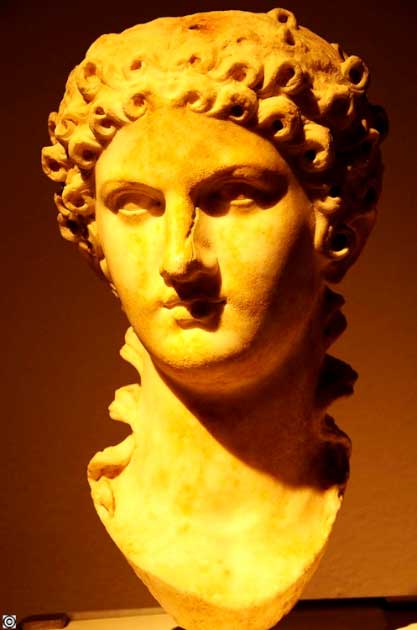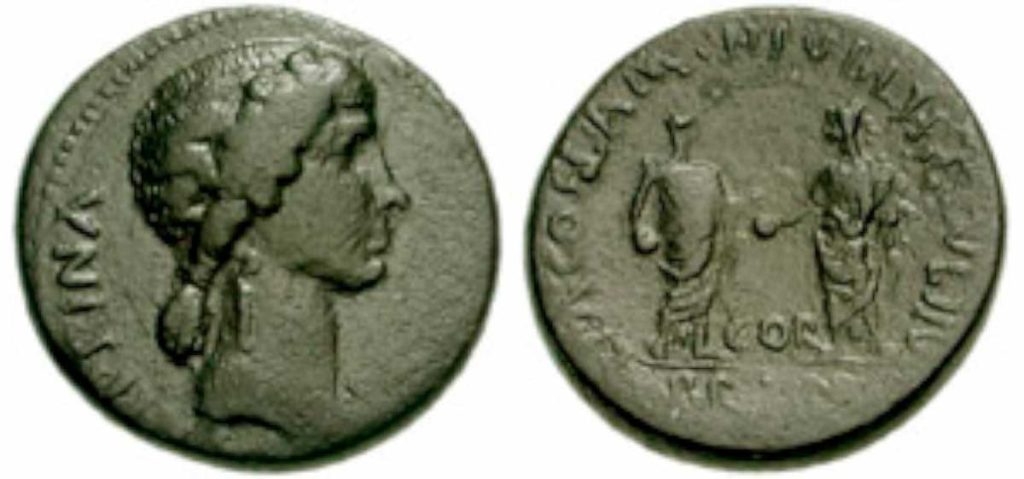Julia Agrippina, or Agrippina the Younger, was a Roman Empress from 49 to 54 AD, the wife of Emperor Claudius and the mother to Emperor Nero. Whilst she is often defined by her male relations, she has an interesting story and role within history herself.
She was the daughter of celebrated Roman general Germanicus and granddaughter to Augustus, the first Roman Emperor. Her brother was Emperor Caligula, and she was at the very heart of the nascent power structure of Imperial Rome.
She was known to be a behind-the-scenes advisor in the Roman state and a keen political player. Additionally, Agrippina was known to be as beautiful as she was politically ruthless ambitious, and domineering. However, her death in 59 was before her time, and her son was at least partially to blame. How did it get to this and what did she do to deserve this fate?
Agrippina’s Family
Agrippina was the first daughter and the fourth surviving child of Agrippina the Elder and Germanicus. Her older siblings were all brothers: Nero, Drusus, and Caligula.
She was named after her mother who was renowned for her modest and heroic nature. Agrippina’s mother was from a prestigious lineage with close blood ties to Pompey the Great whilst her father, Germanicus was a popular general who had been adopted by Emperor Tiberius under the orders of Emperor Augustus.
Agrippina spent much of her early life in Germany. She was born at a Roman outpost on the Rhine near present-day Cologne. She traveled across Germany with her parents until a return to Rome in around 16 AD, to be raised by her grandmother Antonia.
Germanicus and Agrippina the Elder continued onto Syria before Germanicus died suddenly in 19 AD, much to the outrage of the Roman public and military officials. Rumors spread that it was on the orders of Emperor Tiberius: infighting would be a characteristic of the early Roman Empire.
After this time, Agrippina the Younger was raised by her mother, her grandmother, and great-grandmother Livia, wife of Augustus. They lived on the Palatine Hill in Rome.
Beginning of her Political Life
Agrippina was married just after her 13th birthday in AD 28. She was married to her first cousin once removed on her father’s side, a man named Gnaeus Domitus Ahenobarbus. He was a man from a distinguished family and was also related to Augustus on his mother’s side.
Little is known about him or their relationship but the biographer of the Caesars, Suetonius, claims that Domitius was a wealthy but despicable man with a dishonest character. They spent much of their life in Rome and Antium, a coastal town just to the south.
Agrippina was afforded much more honor and influence when her brother, Caligula became emperor in AD 37. She received lots of honors along with her sisters.

Agrippina received what was known as the rights of the Vestal Virgins which allowed her to view public games, her likeness was placed on coinage and had her name added to oaths to the emperor. Around this time, Agrippina became pregnant with a son: Lucius Domitius Ahenobarbus, later to be known as Nero.
Caligula, however, was Emperor at this point and slowly the absolute power of his position corrupted him. He was said to have begun trying to have incestuous relations with his sisters. This behavior led Agrippina and her sister Livilla to plot to kill Caligula.
This failed however and was denounced for their crime. Saved by their blood ties to the Emperor they were not killed, but instead exiled to the Pontine Islands off the coast of Italy.
Return from Exile
This exile only lasted for just over a year. Caligula was overthrown and murdered by the Praetorian Guard and his uncle Claudius was made Emperor. Claudius forgave Agrippina and she returned to political life but kept a low profile staying away from the court and imperial palace.
This did not stop Claudius’s new wife Messalina from viewing Agrippina’s son as a threat to her own lineage and so apparently Messalina ordered the murder of Nero. This plot failed. At this time, Agrippina also became very wealthy, but remained a sympathetic figure for the public of Rome due to the difficulties of her life.
Agrippina was saved by the execution of Messalina in 48 AD. Due to her relationship with one of Claudius’s trusted advisors, Pallas, she became his fourth wife and rose to a position of authority.
Having come to power, Agrippina was not planning on losing it. She quickly eliminated her rivals such as Lollia Paulina whom she accused of black magic. She spent much of her time creating a web of political alliances that she could use to manipulate the court and Claudius.
- Mausoleum of Augustus: Why Are There No Tombs of Early Roman Emperors?
- Mithras, the Soldier’s God: A Roman Secret Society?
She maintained her friendship with Pallas and garnered the support of Claudius’s doctor Xenophon and the head of the Praetorian Guard, Burrus. All in the hope of securing the position of Emperor for her son, Nero.
Fearing that Claudius was beginning to favor Messalina’s son Britannicus, Agrippina turned her murderous intentions to Claudius. Ancient sources claim that she poisoned Claudius with a plate of deadly mushrooms, which left Nero as the viable choice as Emperor.
The Reign of Nero
Agrippina’s hard work paid off and Nero became Emperor in 54 AD. She used her son’s young age to position herself as a power broker, acting as his mentor and regent. Agrippina enjoyed her greatest political influence at this time.

She held court, visited senate meetings, and appeared as a ruling partner on coins and statues. However, her control of her son began to chafe at Nero, and he soon became sick of his overbearing mother. Nero, it would seem, ordered her death.
One account has Nero ordering the building of a self-sinking boat. Agrippina boarded this boat and despite nearly being crushed by the lead ceiling, she survived and made it to safety nearby.
Enraged by this, Nero sent assassins to murder her. Another account has Nero attempting poisoning three times before the boat collapse and assassins. A final account by Cassius Dio accords her the words “Smite my Womb” before the assassins could finally kill her.
Nero would claim that his mother was involved in various plots to kill him. Whether this is true or not is unknown, but Nero likely ordered the murder of his mother.
Nero ordered the cremation of his mother and was apparently distraught. He was no doubt bolstered by the letters of congratulations that filed to Rome celebrating Nero’s survival against his mother. Little did they know how dark his reign would turn out.
Top Image: Agrippina killed one emperor to raise another, destroying her family in the process. Source: Elen31 / Adobe Stock.
By Kurt Readman